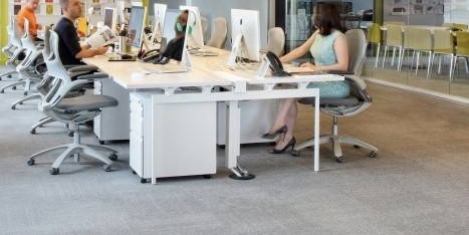March 7, 2017
London businesses bounce back from initial concerns over the Brexit vote 0
 London firms’ optimism has rebounded since a poll taken just after the EU Referendum, according to the latest CBI/CBRE London Business Survey; as its the most recent data reveals that a fifth of companies (19 percent) feel more positive about the economy over the next six months, compared to 4 percent in the last Survey. Firms are also more optimistic about their own businesses over the next half year, with over a quarter (26 percent) feeling positive (compared to 8 percent in the last Survey). Over eight in ten (84 percent) of London’s companies see Crossrail 2 as being central to the capital’s successful expansion. Meanwhile, a similar number of firms (80 percent) think sticking to the Government’s current timetables for building Heathrow’s third runway is vital to London’s attractiveness as a place to invest. As the city continues to expand eastwards, businesses recognise the importance of developing the right infrastructure to support growth in the area, especially in the Docklands. Four fifths of firms (84 percent) think that river crossings in East London are essential for boosting the city’s growth.
London firms’ optimism has rebounded since a poll taken just after the EU Referendum, according to the latest CBI/CBRE London Business Survey; as its the most recent data reveals that a fifth of companies (19 percent) feel more positive about the economy over the next six months, compared to 4 percent in the last Survey. Firms are also more optimistic about their own businesses over the next half year, with over a quarter (26 percent) feeling positive (compared to 8 percent in the last Survey). Over eight in ten (84 percent) of London’s companies see Crossrail 2 as being central to the capital’s successful expansion. Meanwhile, a similar number of firms (80 percent) think sticking to the Government’s current timetables for building Heathrow’s third runway is vital to London’s attractiveness as a place to invest. As the city continues to expand eastwards, businesses recognise the importance of developing the right infrastructure to support growth in the area, especially in the Docklands. Four fifths of firms (84 percent) think that river crossings in East London are essential for boosting the city’s growth.















 The average amount of overtime workers put in equates to around 68 working days a year and the fact that only one third are paid for this means the majority of people are essentially working for free until the 9th of March each year, claims a new study. The research by TotallyMoney.com with OnePoll, which looked into overtime in the UK in 2017 found that unsurprisingly 60 percent of British workers say they don’t have a good work-life balance. Common reasons given for working overtime were pressures from colleague and excessive workloads; with almost 65 percent of people surveyed not being paid for overtime worked. Only a third of British workers say they typically leave work on time; which ties in with recent TUC analysis which revealed that the number of employees working longer hours grew by 15 percent over the last five years. Working longer hours, warns the union, not only has negative impacts on health, but can actually lead to workers being less productive.
The average amount of overtime workers put in equates to around 68 working days a year and the fact that only one third are paid for this means the majority of people are essentially working for free until the 9th of March each year, claims a new study. The research by TotallyMoney.com with OnePoll, which looked into overtime in the UK in 2017 found that unsurprisingly 60 percent of British workers say they don’t have a good work-life balance. Common reasons given for working overtime were pressures from colleague and excessive workloads; with almost 65 percent of people surveyed not being paid for overtime worked. Only a third of British workers say they typically leave work on time; which ties in with recent TUC analysis which revealed that the number of employees working longer hours grew by 15 percent over the last five years. Working longer hours, warns the union, not only has negative impacts on health, but can actually lead to workers being less productive.
 Demand for construction workers in London looks set to grow due to the completion of Crossrail and the extension of the Northern Line alongside other infrastructure projects. But a new analysis reveals the Capital is struggling to attract and train the workforce needed; with London and the South East having a shortfall of 60,000 people in the construction industry. This is according to a first of its kind analysis of the role of migration on London’s economy by London First and PwC.
Demand for construction workers in London looks set to grow due to the completion of Crossrail and the extension of the Northern Line alongside other infrastructure projects. But a new analysis reveals the Capital is struggling to attract and train the workforce needed; with London and the South East having a shortfall of 60,000 people in the construction industry. This is according to a first of its kind analysis of the role of migration on London’s economy by London First and PwC.
 Fostering behavioural change among employees to encourage them to make healthier lifestyle choices could deliver both productivity gains and economic growth, a new report claims. According to Human-Centric Health: Behaviour Change and the Prevention of Non-Communicable Diseases, by the World Economic Forum in collaboration with Willis Towers Watson, behavioural economics will be critical to encourage healthier lifestyles and reduce the burden of non-communicable diseases (cardiovascular disease, mental illness, cancer, chronic respiratory disease and diabetes) that account for approximately 16 million premature deaths annually and will cost an estimated cumulative loss of $47 trillion in economic activity worldwide over the next two decades. According to the analysis, technology such as mobile phones with accelerometers that make activity challenges easier and engage individuals in a community of supportive peers will improve people’s understanding of health-related knowledge and encourage them to reshape their behaviour. Linking individuals to ‘commitment contracts’ to exercise, quit smoking, or adhere to medicine prescription schedules will also be easier to monitor using sensors and mobile technology.
Fostering behavioural change among employees to encourage them to make healthier lifestyle choices could deliver both productivity gains and economic growth, a new report claims. According to Human-Centric Health: Behaviour Change and the Prevention of Non-Communicable Diseases, by the World Economic Forum in collaboration with Willis Towers Watson, behavioural economics will be critical to encourage healthier lifestyles and reduce the burden of non-communicable diseases (cardiovascular disease, mental illness, cancer, chronic respiratory disease and diabetes) that account for approximately 16 million premature deaths annually and will cost an estimated cumulative loss of $47 trillion in economic activity worldwide over the next two decades. According to the analysis, technology such as mobile phones with accelerometers that make activity challenges easier and engage individuals in a community of supportive peers will improve people’s understanding of health-related knowledge and encourage them to reshape their behaviour. Linking individuals to ‘commitment contracts’ to exercise, quit smoking, or adhere to medicine prescription schedules will also be easier to monitor using sensors and mobile technology.




 Very few organisations are ready to manage a workforce where the latest technologies and people work side by side. Just 13 percent of UK companies are ready to respond to digital disruption and create “the organisation of the future”; despite 88 per cent believing this has become a priority. This is according to the 2017 Deloitte Global Human Capital Trends survey, which tracks the top trends shaping the agenda for HR and business leaders. However, while UK companies believe they are ill-prepared for the change brought by digital disruption, this has not stopped many of them from embracing disruptive technologies. 42 per cent report that they have adopted robotics, cognitive and artificial intelligence (AI) technologies within all or parts of their workforce. Another 42 per cent are running pilots in certain areas of their organisation. But only 16 per cent say they are ready to manage a workforce with people, robots and AI working side by side.
Very few organisations are ready to manage a workforce where the latest technologies and people work side by side. Just 13 percent of UK companies are ready to respond to digital disruption and create “the organisation of the future”; despite 88 per cent believing this has become a priority. This is according to the 2017 Deloitte Global Human Capital Trends survey, which tracks the top trends shaping the agenda for HR and business leaders. However, while UK companies believe they are ill-prepared for the change brought by digital disruption, this has not stopped many of them from embracing disruptive technologies. 42 per cent report that they have adopted robotics, cognitive and artificial intelligence (AI) technologies within all or parts of their workforce. Another 42 per cent are running pilots in certain areas of their organisation. But only 16 per cent say they are ready to manage a workforce with people, robots and AI working side by side.








